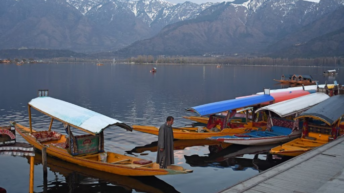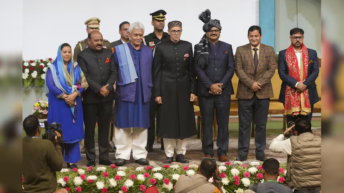|
Listen to article
Getting your Trinity Audio player ready...
|

Justice Sanjay Kishan Kaul was one of the judges on the five-judge Constitution Bench headed by Chief Justice D Y Chandrachud which heard the petitions regarding Article 370. He wrote a separate but concurring judgment covering 121 pages out of a total of 476 pages. From page 1 to 114, he dealt with issues that one petitioner or the other had brought before the Supreme Court. However, from page 114 onwards till the last page of his verdict, he wrote something which he called an EPILOGUE.
In these pages, he wrote about an issue which was not before the apex court at all. In these pages, he makes a recommendation for setting up a Truth & Reconciliation Commission for Jammu & Kashmir. He clearly admits that he is “alive to the challenge that recommending the setting up of a truth and reconciliation is beyond the realm of this Court’’. Nonetheless, he persists in going ahead with making this recommendation.
He says, “I am of the view that transitional justice, and its constituents, are facets of transformative constitutionalism. Globally, constitutionalism has evolved to encompass the responsibility of both state and non-state actors with respect to human-rights violations. This includes the duty to take reasonable steps to carry out investigations of violations. It is in this context that the proposed truth and reconciliation commission accords with constitutionalism.’’
He mentions the Truth & Reconciliation Commission set up by South Africa after the abolition of the Apartheid policy. The commission there is considered a success as it helped the citizens of that nation reach closure. Both the perpetrators and the victims in South Africa were willing to meet each other more than half way, so to say. When these meetings, hundreds and thousands of them, happened, it helped the South African society and nation heal its raw festering wounds.
Justice Kaul may have weighed the idea before putting it on paper and making it a part of the judgement pertaining to Article 370. However, is it possible to do anything like that in the context of all that has happened in J&K? Are there any victims (in J&K) who are willing to come forward and forgive those who hounded them out of their homes and hearths? Are there any perpetrators who are willing to step forward and own up the violence they committed?
There has been an eerie silence in the media about Justice Kaul’s recommendation regarding the commission. The government has not said a word about it officially so far, nor has any unofficial comment been made so far. Various organisations which claim to represent Kashmiri Pandits (KPs), including Panun Kashmir headed by Dr Ajay Chrungoo, have preferred to say nothing on this recommendation.
Days after the Supreme Court judgment was announced, Panun Kashmir held a press conference in Jammu. Besides Dr Chrungoo, some others also spoke to the media about their stance on the verdict, saying that they welcomed it. But beyond that, they did not articulate their thoughts about Justice Kaul’s recommendation. That can be considered significant and can be interpreted as Panun Kashmir’s lukewarm response to the idea. Besides Panun, some other organisations representing Kashmiri Pandits have also welcomed the Supreme Court order. But none of them has said anything significant on record about Justice Kaul’s recommendation.
In the mainstream media, be it newspapers, TV channels, digital portals, or websites dealing with legal issues, one doesn’t find anything about this suggestion. So how is it to be interpreted? What does one make of it? One way of interpreting the total silence on it from all quarters can be that it is an idea that cannot be implemented.
Excerpts from Justice Kaul’s recommendation are reproduced herein.
He says: The Valley of Kashmir carries a historical burden. “We, the people” of Jammu & Kashmir are at the heart of the debate, he adds. People had to migrate out of their homes to far-away places and this was not done voluntarily but in fear harm and even death. Those who fled their houses were from one community, an indirect reference to Kashmiri Pandits (KPs), he points out.
For reconciliation in Jammu & Kashmir, some steps need to be taken. He then points out that “South Africa’s truth and reconciliation commission was set up to investigate human rights violations perpetrated during the period of the Apartheid regime. It served as a means of reckoning or catharsis for victims, and fostered peace-building.’’
120- In view of the in-roads made globally, and endogenous requests for truth and reconciliation, I recommend the setting up of an impartial truth and reconciliation commission (“Commission”). The Commission will investigate and report on the violation of human rights both by State and non-State actors perpetrated in Jammu & Kashmir at least since the 1980s and recommend measures for reconciliation.
121- This Commission should be set up expediently before memory escapes. The exercise should be time-bound. There is already an entire generation of youth that has grown up with feelings of distrust and it is to them that we owe the greatest duty of reparation.
124. As a word of caution, the Commission, once constituted, should not turn into a criminal court and must instead follow a humanized and personalized process enabling people to share what they have been through uninhibitedly. It should be based on dialogue, allowing for different viewpoints and inputs from all sides.
125. Taking a leaf out of South Africa’s book, the principles of “ubuntu”, or the art of humanity, and inclusiveness should be central to the process. This will facilitate a reparative approach that enables forgiveness for the wounds of the past and forms the basis of achieving a shared national identity. Needless to say, the Commission is only one of the many avenues toward the goal of systemic reform. It is my sincere hope that much will be achieved when Kashmiris open their hearts to embracing the past and facilitate the people who were compelled to migrate to come back with dignity. Whatever has been, has been but the future is ours to see.






Add comment